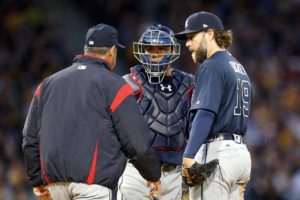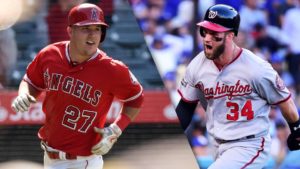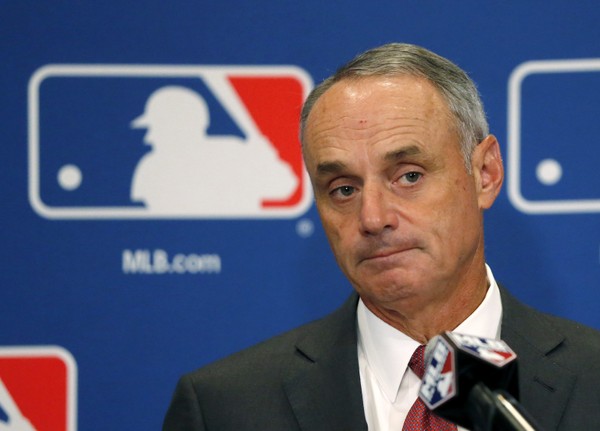Analyzing the state of Major League Baseball from afar. From afar – because I, like many have pulled away. I haven’t abandoned the game, I’m no quitter, but the need for change is clear. Baseball was the sport I excelled in, grew to love, watched religiously and it ruled my world from tot years to adulthood. Fifteen years ago my favorite sport was baseball. Fast forward, our national pastime is stuck in the past tense. It’s just not the same.
Living in the best baseball town in America I find myself very distant with the exception of pivotal games or anything that sniffs playoff contention. Just when I think I’m out, they pull back in; but is that enough? This is an important question because many people are like me. Is 50% involvement good? Is a stadium filling at 50% good? Probably not. I’ll explain…
The Miami Marlins coming to a town near you or a majority of you is a possibility. The dwindling attendance numbers are a direct reflection of a slow and often lackluster game. Baseball has always been notoriously slow-moving and slow to adapt.

While MLB struggles with attendance and television ratings, the NHL and NBA are experiencing growth spurts. Fans from unlikely places are tuning in, novice baseball fans are tuning out, and diehards are even impatient. Don’t believe me, check your social media feed, and tell me what the heck your 68-year-old uncle is doing weighing in on the MJ/Lebron debate? You think half these people knew who Alexander Ovechkin was 10 years ago?
So what’s killing the game? The obvious is average game length and the speed, my lord the speed. I feel the need for speed! Cutting down mound visits. Hmmm, thanks? Shout out to MLB for the 38 seconds saved per game, and in some cases, adding. Extra innings are a real stinger. More slow, boring baseball and beer sales are killed. Yay! Just what the folks want! Walk city and bunt town USA aren’t helping either. Chicks dig the long ball. Yep, dudes do too. Offense is rationed. Parity is not a thing. Teams are boring. The offseason never delivers what’s on the menu. Mostly it’s disappointing.
Right now, Bryce Harper and Mike Trout are less popular than Kawhi Leonard and T.J. Oshie. That is lunacy. But wait, home runs are actually up. No-hitters happen, walk-offs happen, and in fact there is some thrilling baseball happening every night. So where have all the fans gone?

What are some alternatives and solutions to halt this slow demise? To be clear, the game will never be extinct, the traditionalists and purists won’t allow it, but appealing to the youth is seemingly harder each season. Coming off a robust World Series full of offense, followed up with offseason changes that were designed to speed up the game it was probably tough to predict the massive drop in attendance, however the fact MLB has been analyzing and implementing change shows they knew the problem was real. Did they wait too long? Again, the ideal is to speed up the game. The league has been very clear on that. It’s a known issue.
Nearing the halfway point of the season attendance is down 8.6% year over year, the largest attendance drop since 1995, the year of the strike. Many recall, it took a Mark McGwire and Sammy Sosa showdown to revive the sport. Later we found out something we already knew, the juice was loose. How juicy the baseballs were, no one really knows. How juicy the players were, VERY. Hey, it worked. Performance enhancers rescued our national pastime. If that seems like a weird thing to read, that’s because it’s a weird thing to write. While that’s not ideal, it worked. How does baseball find 1998?
The issues at hand
- The Heat: Well, we have no control over this. In many areas baseball is just plain miserable from June through August. If you expect folks to spend their hard-earned money as they roast, the product better be good.
- Extra Innings: Solutions here are tough and I expect lots of pushback, but hear me out… Draws, yes draws. Hockey adapted the model and it works wonderfully. College football, NFL, Soccer – most everyone at some point adopts a draw system to shorten the length of games, keep players healthy and not exhaust the bench and the fans.
- Lack of minority representation: Fact is, sports appeal to everyone – golf’s explosion is directly tied to Tiger Woods. Hockey’s boom coincides with more ‘faces’ on the screen. Does MLB need to make changes here? Can they? Not necessarily and not sure, but it’s worth noting it plays a role.
- Tradition: Baseball being so married to the narrative of America’s National Pastime firmly committs the league to a stance of not making changes, and when they do, clearly stating it’s painful for them to do so. Stacking fans in boxes and prioritizing groups in any particular order is bad business. Not in the sense of actual ‘business’ – profitability is a non-issue, but to openly cater to older fans only and doing it loudly, naturally turns off younger fans.
- Game start times: Day games which appeal to who? The majority of night games starting at 7pm and lasting three hours in the middle of a hectic work week does not appeal to fans, specifically to parents. If you’re going to drag your kids along with you or pony up for a sitter, it’s best if it’s not a complete bore. My 13-year-old chose piano rehearsal over ball games every time, eventually I stopped asking.
- Length of season: Again I UNDERSTAND TRADITION, but Holy Smokes, maybe knock a few games off?
- Star Power: The NBA is AMAZING at bringing groups of talented players together to run ads. MLB should adopt this process. Waiting until the postseason to market stars in groups doesn’t make much sense. This should be a constant.
- Annual playoff representation: There are way too many teams entering the season knowing their chance of competing requires some super natural stuff to go down. We have spikes, yes Kansas City started to show up, The White Sox, Reds and Mariners did some cool stuff for a time, and even though the NBA has run back the same Finals episode more times than Married With Children we still feel like there is more parity, because of the amount of teams that get a shot at post season
- Commercial breaks: I get it, you have to pay bills, but it’s too predictable and there is no change or break in monotony. None. There’s the final out, you tell me the next three guys up, every now and then some retired legend enters the box, they talk about some stuff, pitch by pitch analysis – and we just do that thing over and over, and at some point the game ends and we have a winner. I feel like I can change the channel at any time, and not miss much.
- The season is absolutely exhausting for a fan base, especially if it becomes clear their team has no chance at making the playoffs. The ballpark then becomes a place to hang out, have beers and meet up. Sure it’s fun, but the game is rendered meaningless to many. Casual fans are fickle, and if the game doesn’t mean much, depending where you live, generally there are other things to do besides baseball.
So the solution? Who knows, but here I go…
Structure of season: Play more Spring Training games at night on Prime Time. Not all, but more. Granted, the only reason I give a crap about preseason football is for the Fantasy impact, but I at least know the games are on. It’s never a surprise. There is no worse way to hype the opening of a season than to hide the games at 1pm on backdoor networks.
Move to 144 games, shave 18. Eight teams advance from each league, the length of season isn’t expanded much with extra playoff games due to less regular season games, and the additional games are more meaningful. You invite a ton more cities to the party, and they tell all their friends. Dump the Wild Card game. There is no more horrible way to end a season. All playoff losses hurt, but losing 162 in 9 is rough.
Between innings: More onboard – live broadcasting – on-air mentions of partners to spend more between-inning time dedicated to game analysis and not solely dedicated to advertisements. Mic everyone you can. Social media exploded last week. Mets Manager, Terry Collins and veteran umpire, Tom Hallion went head to head and it was sensational! Never have casual or non-baseball fans been more intrigued and excited about a non-baseball play. The problem here, MLB was not happy about it and worked hard to remove it from the internet streams. This is another traditionalism issue with the Pastime. Even though the fans are screaming and begging for this, the league doesn’t want it. The on-field 4th inning talk between sideline reporters and managers are meh. We don’t care. We want the juicy stuff! Make me stick around between a commercial for once. Surely this sort of thing doesn’t happen every night. So what – give me mic’d up clips from a different game or team. One on One player interviews between one of the innings, so we can get to know the guys. Find another way to pay sponsors. This is simply adapting to the time, not remaining stuck in the past.
Logistics: No game should ever start after 6pm, and every new stadium built should require a roof. Not the most practical fix, but potentially helpful down the road. Delays happen, it’s life but it’s a major buzz kill and severely stagnates the game. It’s a bad experience for the consumer, packing up the family, heading to the ballpark only to hang around for two hours, and the game never starts or never finishes. Like the heat rain is not a controllable, but better planning is helpful. A hint of severe weather – call it sooner. Kids on school nights sitting at the ballpark at 10pm waiting for a game to end is not good, leaving in the 6th isn’t much better. Games need to start at 6pm. I realize the impact on the west coast, but there are already hundreds of 12/1pm start times every season.
Star Power: We are truly lucky to watch some of these guys every day, and it’s just not enough. You should not have to be a die-hard fan to know who Manny Machado is. It’s almost catastrophic how good some of these guys are, and no one knows. They become less marketable as the sport dwindles into some old man’s game. In their areas they’re big. Nationwide they’re not. We can’t waste this talent.
If average viewer age is 50 years old and our younger folks aren’t engaged who picks up the slack 30 years from now?


